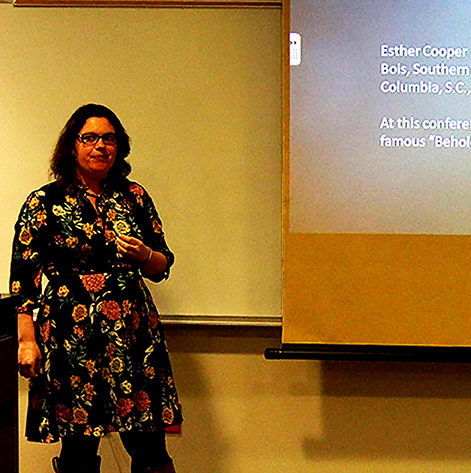Associate professor of history at St. Francis College and author Sara Rzectuek, Ph.D., presented a special lecture Thursday, Feb. 7.
This event was part of the university’s Black History Month programming. Rzectuek’s presentation explored Southern black radicalism in post-World War II America with an emphasis on the Southern Negro Youth Congress.
Assistant professor of history Rebecca Turri, Ph.D., explained how the presentation came about.
“I wanted to invite a scholar who studied radical black history to campus because so often when you think of radicalism, you think about civil rights, armed resistance and black power, but there is another history out there of labor organizing and kind of the efforts made much earlier than the Civil Rights Movement,” Turri said.
The lecture expressed the importance of the Southern Negro Youth Congress: its rise, fall and demise. The Congress’ main focus was on helping African Americans gain basic human rights. However, it was eventually disbanded due to the fear of Communist conspiracies.
Graduate history and library science student John Carter said the forum was amazing to listen to.
“The actual idea of having the association between Communism and segregation was a really interesting topic to look at in general,” Carter said. “When people began to realize what the organization was about, they decided to call them Communist and that eventually led to the downfall of the Southern Negro Youth Congress.”
Rzectuek said she struggled with trying to educate people about sensitive topics in history.
“Talking about Communism is still very fraught in this country, and that’s probably one of the hardest things. You do run into some resistance to the idea that Communists actually made contributions because there is this sort of legacy from the Cold War,” Rzectuek said.
Rzectuek said that she wants people to truly understand the impact of the Civil Rights Movement and how it forever changed history.
“I think it’s just really important for people to understand the longer progression of civil rights in the United States and issues around black freedom and the different trends and moments,” Rzectuek said. “It’s not just something that popped up in the mid-1950s, and it’s something that existed in different moments. It was influenced by things like political and diplomatic elements. All those changes and all those issues are important to understand.”
Rzectuek said the Civil Rights Movement will continue to shape future generations.
“People in Southern Negro Youth Congress had children who were involved in other organizations later on,” Rzectuek said. “For example, Angela Davis is a very active scholar and thinker. Her mother was a Southern Negro Youth Congress member. The organization may go away, but that doesn’t mean people’s ideas and their commitment to causes go away because people raise their children with these ideas, and that is something that will carry on generationally,” Rzectuek said.
For more information about the Southern Miss Center for the Study of the Gulf South, visit www.usm.edu/gulf-south.

























